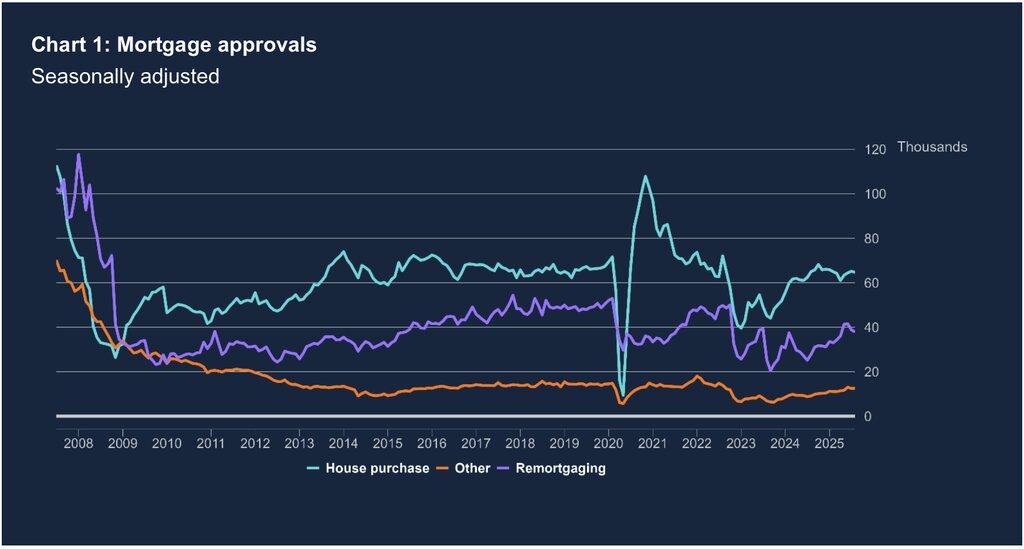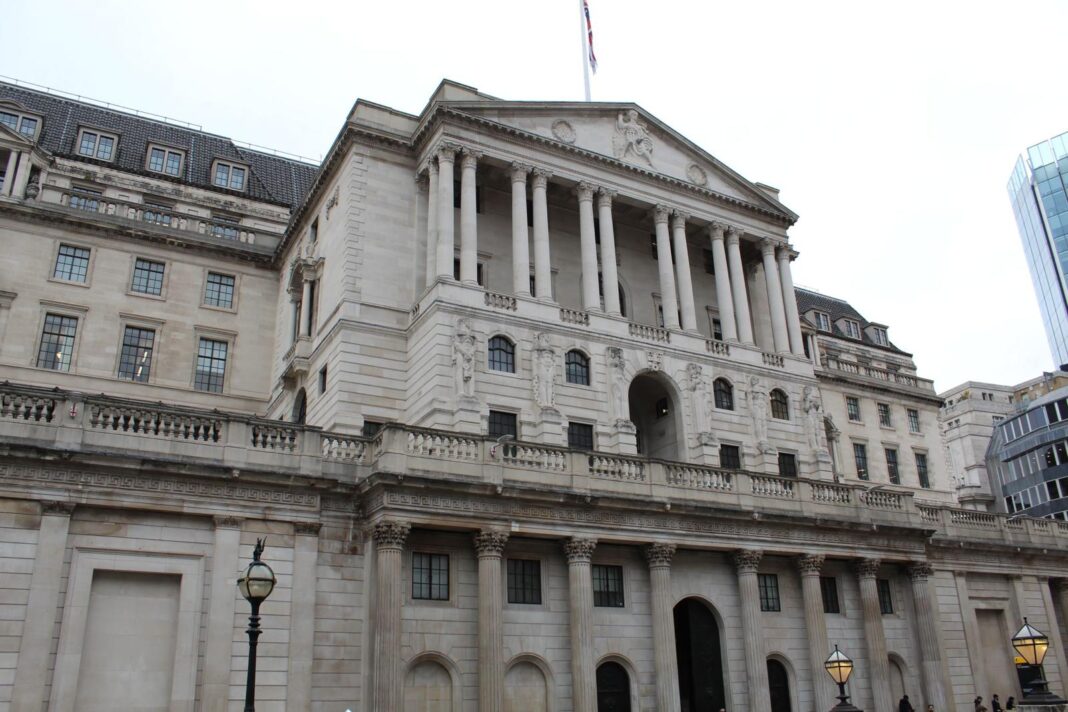Households are pulling back on mortgage borrowing even as businesses accelerate their demand for finance, according to the Bank of England’s latest Money and Credit data.
Net mortgage lending slipped to £4.3 billion in August, down from £4.5 billion in July. Gross lending fell to £22.7 billion from £24.5 billion a month earlier, while repayments edged up to £20.0 billion.
Approvals also softened: house purchase approvals fell slightly to 64,700, while remortgaging approvals declined to 37,900.
Despite the slowdown, the annual growth rate of mortgage lending nudged higher to 3.0% from 2.9%. Rates offered some respite for new borrowers, with the average on newly drawn mortgages falling for the sixth consecutive month to 4.26%. But for those on existing loans, costs continued to creep up, with the average rate on the stock of mortgages rising to 3.89%.
BORROWING SPLIT
Consumer credit held steady at £1.7 billion. Credit card borrowing dipped to £0.7 billion, while other forms of consumer credit, such as personal loans and car finance, rose to £1.0 billion. Annual growth in consumer credit inched up to 7.1%.

Borrowing costs remain steep: overdraft rates climbed to 21.53%, and personal loans rose to 8.32%, though credit card rates eased slightly to 21.42%.
CORPORATES STEP UP
Businesses, meanwhile, are tapping banks at pace. Private non-financial corporations borrowed £5.9 billion in August, a sharp rise from £0.4 billion in July. Lending to large businesses grew at an annual rate of 8.6%, while SME borrowing edged up to 1.2% – its fastest growth since August 2021.
The broad measure of sterling money (M4ex) rose by £10.9 billion, up from £6.7 billion in July. Households added £5.4 billion across ISAs, current accounts and sight deposits, while corporates contributed £5.6 billion.
ECONOMIC UNCERTAINTY

Richard Donnell, Executive Director at Zoopla, says: “The demand for mortgages cooled in August with 500 fewer approvals for mortgages to buy homes, down to 64,700.
“It appears that higher borrowing costs and broader economic uncertainty are prompting a pause for reflection among homebuyers. Demand for homes at the upper end of the market is already being hit ahead of the Budget as speculation grows over possible changes to the taxation of high value homes.”
HOUSING MARKET PRESSURES

Ian Futcher, Financial Planner at Quilter, adds: “The residual effects of stamp duty changes, combined with ongoing affordability issues and the typical summer slowdown, are still dampening activity.
“Mortgage borrowing saw a sharp decline following the changes to stamp duty earlier this year, and it has been struggling since. [These] figures show this trend has continued, as net borrowing of mortgage debt fell by £0.2 billion in August to £4.3 billion, following a £0.9 billion decrease to £4.5 billion in July.
“Approvals for house purchases – a key forward-looking measure – fell by 500 in August to 64,700, while remortgaging activity also continued to decline, with approvals dropping by 900 to 37,900.”
SUMMER SLOWDOWN
And he added: “Although a summer slowdown is typical, when combined with the other ongoing market pressures, including budget rumours, it could have wider implications for house prices.
“We are already seeing a dip in demand for homes over £500,000, for example. However, as we move further into the autumn and winter, the market will have had time to adjust to the stamp duty changes and more prospective buyers will have built up their savings enough to cover the higher tax bills, so we could see a gradual return of momentum.”
INDUSTRY REACTION

Jeremy Leaf, north London estate agent and a former RICS Residential Chairman, says: “Mortgage approvals always set the scene for housing market activity over the next few months but unfortunately these do not paint a particularly pretty picture.
“The impact of Budget rumours in particular which began swirling at the end of the period covered in this data is inevitable, resulting in fewer listings and buyers, as well as price renegotiation and slower transactions.
“However, the overwhelming majority of sales in our offices are holding together although some vendors clearly still need a dose of realism.”
ECONOMIC UNCERTAINTY

Nathan Emerson, Chief Executive of Propertymark, says: “Continued economic uncertainty and a traditionally quieter period during the summer holidays, alongside anxiety over the UK Government’s upcoming budget and decisions being made on interest rates, have perhaps contributed towards this decrease in mortgage approvals.
“However, the Bank of England’s freeze on interest rates last week will contribute to future confidence and stability in the mortgage market now that people on variable mortgages and those looking to finance their next home move have additional reassurance of static rates for now.
“We now look to November, which is when the next interest rate decision will be made.
“It is important that consumers monitor upcoming mortgage deals, as they can vary significantly given current economic circumstances.”
AFFORDABILITY CHALLENGES

Jason Tebb, President of OnTheMarket, says: “Despite August being a traditionally quieter time of the year for the housing market, and in face of wider political and economic concerns, there was remarkable resilience with approvals for house purchases – an indicator of future borrowing – dipping only slightly on the previous month.
“With the rate on newly-drawn mortgages falling again for the sixth consecutive month, affordability challenges continue to ease. Five base rate reductions from the Bank of England in the past year have helped, along with recently relaxed lending rules, enabling many buyers to boost their borrowing.”
SEASONAL SLOWDOWN

Colby Short, Co-founder and Chief Executive of GetAgent, says: “Mortgage approvals dipped slightly in August, putting an end to three straight months of upward growth.
“However, a seasonal slowdown in mortgage market activity is hardly surprising given the distraction of the summer sun and the school holidays, which tend to slow productivity across many areas of life.
“The broader picture, however, remains one of consistency and with an improving mortgage landscape offering more products, sharper rates, and greater flexibility, demand is being well supported.
“The latest hold on the base rate will only help to steady the ship as we head into a traditionally busy time of year, leaving the market well positioned for a late surge to the finish line in 2025.”
LANDLORD OPPORTUNITIES

Emma Cox, MD of Real Estate at Shawbrook, says: “Following a increase in July, August has had a surprise dip as concerns surrounding affordability stifle growth.
“As the economic environment remains challenging and with minimal movement in house prices, buyers and professional landlords will be hoping that a more stable interest rate environment will lead to more favourable deals entering the market.
“Despite the slight dip in approvals, professional landlords will be reassured by a stable market and continued strong tenant demand which has given many investors the confidence to continue.
“This opens up further opportunities for landlords to capitalise, expand their portfolios, maximise yields and grow their businesses.”










